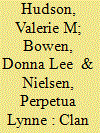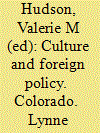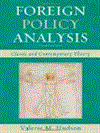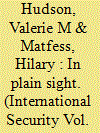|
|
|
Sort Order |
|
|
|
Items / Page
|
|
|
|
|
|
|
| Srl | Item |
| 1 |
ID:
140810


|
|
|
|
|
| Summary/Abstract |
We propose that the relative influence of clans is an important explanatory factor producing significant variation in state stability and security across societies. We explore the micro-level processes that link clan predominance with dysfunctional syndromes of state behavior. Clans typically privilege agnatic descent from the patriline and are characterized by extreme subordination of women effected through marriage practices. Particular types of marriage practices give rise to particular types of political orders and may be fiercely guarded for just this reason. We construct and validate a Clan Governance Index to investigate which variables related to women's subordination to the patriline in marriage are useful to include in such an index. We then show that clan governance is a useful predictor of indicators of state stability and security, and we probe the value added by its inclusion with other conventional explanatory variables often linked to state stability and security.
|
|
|
|
|
|
|
|
|
|
|
|
|
|
|
|
| 2 |
ID:
048876


|
|
|
|
|
| Publication |
Colorado, Lynne Rienner Pubolishers, Inc., 1997.
|
| Description |
ix, 293p.
|
| Standard Number |
1555876404
|
|
|
|
|
|
|
|
|
|
|
|
Copies: C:1/I:0,R:0,Q:0
Circulation
| Accession# | Call# | Current Location | Status | Policy | Location |
| 039578 | 327/HUD 039578 | Main | On Shelf | General | |
|
|
|
|
| 3 |
ID:
082622


|
|
|
|
|
| Publication |
2008.
|
| Summary/Abstract |
Existing formal models of political behavior have followed the lead of the natural sciences and generally focused on methods that use continuous-variable mathematics. In 2002, Stephen Wolfram produced an extended critique of that approach in the natural sciences, and suggested that a great deal of natural behavior can be accounted for using rules that produce discrete patterns. This paper reports some initial findings designed to apply this pattern-based method to political event data. We believe that discrete sequence rule (DSR) models can provide a new social science methodology that is capable of preserving the agential basis of social interaction, tracking multiple agents as they enact rules through behavior directed at one another, and capturing the evolution of such interaction over time. The core of this project is a new, publicly accessible Web-based tool designed for the visualization and analysis of event data patterns Using event data on the Israel-Palestine conflict generated by the TABARI automated coding program of the Kansas Event Data System (KEDS) for the period 1979-2004, we perform an initial exploration of this methodology. Specifically, we identify patterned behavior for which specific rule use can be imputed, and then examine several agent-based rules, plus four "meta-rules," to parse Israeli-Palestinian interaction over time. Face validity of the analysis is apparent, and we also find the qualitative historical record can be augmented through observation of rule enactment in the event stream. Several descriptive empirical applications are demonstrated, including moving totals and increasingly complex sequences of rule enactment that go beyond the simple variations on tit-for-tat responses. While this paper represents an exploratory analysis of the method, the results are promising enough to warrant further investigation beyond its use in thick description as demonstrated here, to ultimately include hypothesis generation and falsification
|
|
|
|
|
|
|
|
|
|
|
|
|
|
|
|
| 4 |
ID:
134363


|
|
|
|
|
| Edition |
2nd ed.
|
| Publication |
Lanham, Rowman and Littlefield, 2014.
|
| Description |
vii, 257p.Hbk
|
| Standard Number |
9781442220034
|
|
|
|
|
|
|
|
|
|
|
|
Copies: C:1/I:0,R:0,Q:0
Circulation
| Accession# | Call# | Current Location | Status | Policy | Location |
| 057896 | 327.101/HUD 057896 | Main | On Shelf | General | |
|
|
|
|
| 5 |
ID:
085679


|
|
|
|
|
| Publication |
2009.
|
| Summary/Abstract |
Does the security of women influence the security and behavior of states? Existing evidence linking the situation of women to state-level variables such as economic prosperity and growth, health, and corruption is fairly conclusive. Questions remain, however, concerning the degree to which state security and state security-related behavior is linked to the security of women. The "women and peace" thesis draws upon evolutionary biology/psychology for ultimate causes of this linkage, and sociological theories of social diffusion and psychological theories of social learning for more proximate causal mechanisms. Together, a new data resource-the WomanStats Database-and conventional methodology find a robust, positive relationship between the physical security of women and three measures of state security and peacefulness. In addition, a comparison of this proposition to alternative explanations involving level of democracy, level of economic development, and civilizational identity shows that the physical security of women is a better predictor of state security and peacefulness. Although these results are preliminary, it is still possible to conclude that the security of women must not be overlooked in the study of state security, especially given that the research questions to be raised and the policy initiatives to be considered in the promotion of security will differ markedly if the security of women is seriously considered as a significant influence on state security.
|
|
|
|
|
|
|
|
|
|
|
|
|
|
|
|
| 6 |
ID:
153630


|
|
|
|
|
| Summary/Abstract |
Approximately seventy-five percent of the world's population lives in countries where asset exchange upon marriage is obligatory. Rising brideprice—money or gifts provided to a woman's family by the groom and his family as part of marriage arrangements—is a common if overlooked catalyst of violent conflict. In patrilineal (and some matrilineal) societies where brideprice is practiced, a man's social status is directly connected to his marital status. Brideprice acts as a flat tax that is prone to sudden and swift increases. As a result, rising brideprice can create serious marriage market distortions that prevent young men, especially those who are poor or otherwise marginalized, from marrying. This phenomenon is especially evident in polygamous societies, where wealthy men can afford more than one bride. These distortions incentivize extra-legal asset accumulation, whether through ad hoc raiding or organized violence. In such situations, rebel and terror groups may offer to pay brideprice—or even provide brides—to recruit new members. Descriptive case studies of Boko Haram in Nigeria and various armed groups in South Sudan demonstrate these linkages, while an examination of Saudi Arabia's cap on brideprice and its efforts to arrange low-cost mass weddings illustrates the ways in which governments can intervene in marriage markets to help prevent brideprice-related instability. The trajectory of brideprice is an important but neglected early indicator of societal instability and violent conflict, underscoring that the situation and security of women tangibly affect national security.
|
|
|
|
|
|
|
|
|
|
|
|
|
|
|
|
| 7 |
ID:
101889


|
|
|
| 8 |
ID:
188046


|
|
|
|
|
| Summary/Abstract |
The overwhelming percentage of the perpetrators of terrorism are male: is this noteworthy, or not? We believe that it is. More specifically, we believe there is a complex mix of sex-linked grievance for men, sex-linked training for men, and sex-linked lack of voice for women that facilitates, and may even catalyze, the perpetration of terrorism. Without knowledge of those sex-linked pathways, we argue that efforts to counter terror are less effective than they might be. We first survey the literature on the causes of terrorism, as well as the literature linking inequality between the sexes to incidence of terrorism. After laying this foundation, we next contribute a theoretical framework linking the subordination of women to the incentivizing of specifically male engagement in terrorism, and then test that framework through aggregate statistical testing on a sample of 155 nations for a variety of non-state and state terrorism outcome variables. The subordination of women, as also mechanisms of marriage market obstruction including brideprice, prove highly significant and with notable effect sizes even after controlling for several alternative explanatory variables. Finally, we probe implications of our findings for efforts to counter terrorism and violent extremism.
|
|
|
|
|
|
|
|
|
|
|
|
|
|
|
|
| 9 |
ID:
094412


|
|
|
|
|
| Publication |
2010.
|
| Summary/Abstract |
Theoretical insights from evolutionary psychology and biology can help academics and policymakers better understand both deep and proximate causes of Islamic suicide terrorism. The life sciences can contribute explanations that probe the influence of the following forces on the phenomenon of Islamic suicide terrorism: high levels of gender differentiation, the prevalence of polygyny, and the obstruction of marriage markets delaying marriage for young adult men in the modern Middle East. The influence of these forces has been left virtually unexplored in the social sciences, despite their presumptive application in this case. Life science explanations should be integrated with more conventional social science explanations, which include international anarchy, U.S. hegemony and presence in the Middle East, and culturally molded discourse sanctioning suicide terrorism in the Islamic context. Such a consilient approach, melding the explanatory power of the social and life sciences, offers greater insight into the causal context of Islamic fundamentalist suicide terrorism, the motivation of suicide terrorists, and effective approaches to subvert this form of terrorism.
|
|
|
|
|
|
|
|
|
|
|
|
|
|
|
|
| 10 |
ID:
093093


|
|
|
|
|
| Publication |
2009.
|
| Summary/Abstract |
This article describes the WomanStats Project Database - a multidisciplinary creation of a central repository for cross-national data and information on women available for use by academics, policy-makers, journalists, and all others. WomanStats is freely accessible online, thus facilitating worldwide scholarship on issues with gendered aspects. WomanStats contains over 260 variables for 174 countries and their attendant subnational divisions (where such information is available) and currently contains over 68,000 individual data points. WomanStats provides nuanced data on the situation and status of women internationally and in so doing facilitates the current trend to disaggregate analyses. This article introduces the dataset, which is now publicly available, describes its creation, discusses its utility, and uses measures of association and mapping to draw attention to theoretically interesting patterns concerning the various dimensions of women's inequality that are worthy of further exploration. Two of nine variables clusters are introduced - women's physical security and son preference/sex ratio. The authors confirm the multidimensionality of women's status and show that the impact of democracy and state wealth vary based on the type of violence against women. Overall, the authors find a high level of violence against women worldwide.
|
|
|
|
|
|
|
|
|
|
|
|
|
|
|
|
|
|
|
|
|